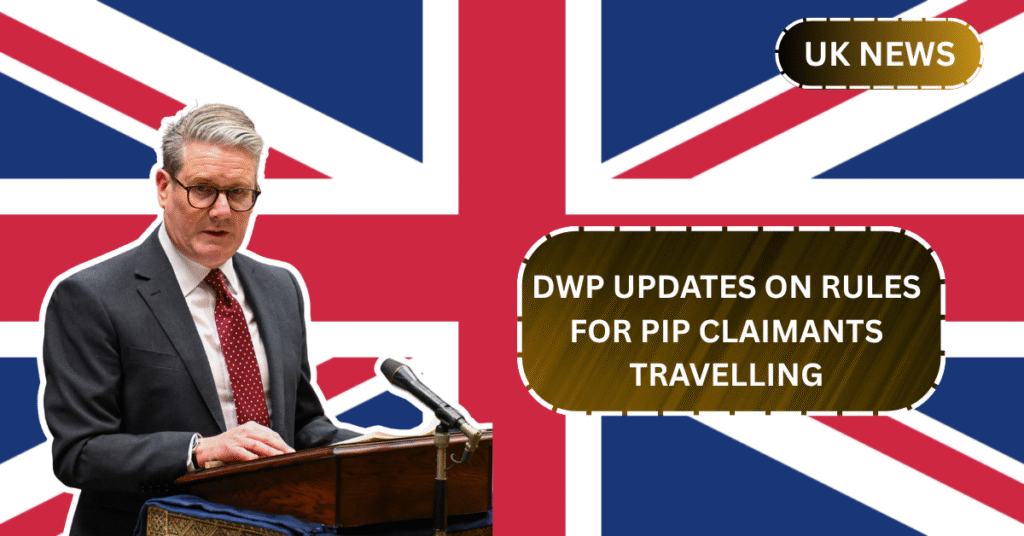Planning a holiday abroad this summer? If you receive Personal Independence Payment (PIP), then you need to be extra careful. The Department for Work and Pensions (DWP) has rules in place that could stop your PIP payments or even affect your entitlement if you don’t inform them about your travel.
Here’s everything you need to know – in simple, clear terms.
What Is PIP and Who Gets It?
This Article Includes
- 1 What Is PIP and Who Gets It?
- 2 Why DWP Might Stop Your PIP Payments
- 3 Key Travel Rules for PIP Claimants
- 4 Are Short Holidays Allowed?
- 5 What If You’re Travelling for Medical Treatment?
- 6 How to Inform the DWP Before Going Abroad
- 7 What If DWP Checks Your Status?
- 8 What Happens If You Don’t Follow the Rules?
- 9 Final Thoughts
PIP (Personal Independence Payment) is a benefit given to people who need help with daily living or mobility due to a long-term illness or disability. It is not income-based, and you can receive it whether you’re working or not.
PIP has two parts:
- Daily Living – for help with everyday tasks like cooking, washing, or communicating.
- Mobility – for help with moving around or going out.
You can get either one or both, depending on your condition.
Why DWP Might Stop Your PIP Payments
PIP is meant for people living in the UK. That’s why if you leave the country – even for a short time – you must let the DWP know. If you don’t, they may consider it a change in your circumstances and stop or reduce your payments.
Here’s what the DWP rules say:
You must inform them if you leave the country for more than 4 weeks (or are planning to).
This applies even if the trip is for:
- A holiday
- Family visit
- Medical treatment abroad
Key Travel Rules for PIP Claimants
Here are the basic travel rules PIP claimants should keep in mind:
You must inform DWP if:
- You’re going abroad for more than 4 weeks
- You’re planning to stay in another country for a long duration
- You have moved permanently from the UK
You might lose your PIP if:
- You don’t inform DWP before leaving
- You stay abroad longer than 13 weeks (unless it’s for medical treatment)
- You are found to be living abroad permanently
Are Short Holidays Allowed?
Yes. If your trip is less than 4 weeks, you can usually go on holiday without any issues – but it’s still good to keep records or tickets in case DWP ever asks.
If your health condition changes during or after your trip, you should report that too, because it could affect your PIP amount.
What If You’re Travelling for Medical Treatment?
There’s an exception. If you’re receiving medical treatment abroad, PIP can still be paid for up to 26 weeks. But again, you must inform DWP before you leave and provide the necessary medical details.
How to Inform the DWP Before Going Abroad
You can call the PIP enquiry line:
Telephone: 0800 121 4433
Textphone: 0800 121 4493
Opening Hours: Monday to Friday, 9am to 5pm
Tell them:
- When you’re going
- Where you’re going
- Why you’re going
- How long you’ll be away
It’s better to be safe than sorry. Informing them upfront can help avoid delays or cancellation of your payments.
What If DWP Checks Your Status?
DWP can review your claim at any time. They sometimes use:
- Border checks
- Tip-offs
- Social media activity
- Other government data
If they find out that you were abroad and didn’t report it, they could:
- Stop your PIP
- Ask you to repay money
- Investigate for benefit fraud
What Happens If You Don’t Follow the Rules?
If you don’t follow the travel rules, DWP could:
- Suspend your payments
- Cancel your benefit claim
- Take legal action for benefit fraud
- Affect your future claims
It’s not worth the risk. Always stay transparent.
Final Thoughts
Going on holiday is something we all deserve – especially if you’re living with a condition. But if you receive PIP, it’s very important to stay informed and follow DWP’s rules.
Even an innocent mistake can lead to payment issues or loss of support. So before you pack your bags this summer, make sure you’ve made that call to the DWP.




